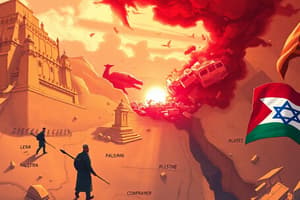Podcast
Questions and Answers
What was the Madrid Peace Conference a pivotal diplomatic effort to address?
What was the Madrid Peace Conference a pivotal diplomatic effort to address?
- The Arab-Israeli conflict (correct)
- The Israeli-Lebanese conflict
- The Israeli-Jordanian conflict
- The Israeli-Egyptian conflict
What was the main goal of the Oslo Accords?
What was the main goal of the Oslo Accords?
- To establish a Palestinian state
- To promote economic cooperation between Israel and Jordan
- To recognize each other's sovereignty and establish international boundaries
- To establish a partnership for negotiating border disputes and creating Palestinian self-governance (correct)
What led to the breakdown of the Oslo Accords?
What led to the breakdown of the Oslo Accords?
- The increasing terror attacks and the assassination of Israeli Prime Minister Yitzhak Rabin (correct)
- The assassination of Israeli Prime Minister Yitzhak Rabin
- The failure of the Camp David talks in 2000
- The establishment of the Palestinian Authority
What was the significance of the Jordan-Israel Peace Treaty?
What was the significance of the Jordan-Israel Peace Treaty?
What was the outcome of the breakdown of the Oslo Accords?
What was the outcome of the breakdown of the Oslo Accords?
Who was assassinated in 1995?
Who was assassinated in 1995?
What was the significance of Yitzhak Rabin's assassination?
What was the significance of Yitzhak Rabin's assassination?
Which of the following is true about the Jordan-Israel Peace Treaty?
Which of the following is true about the Jordan-Israel Peace Treaty?
What was the main outcome of the Madrid Peace Conference?
What was the main outcome of the Madrid Peace Conference?
What was the significance of the Oslo Accords in 1993?
What was the significance of the Oslo Accords in 1993?
What was the historical significance of the Madrid Peace Conference?
What was the historical significance of the Madrid Peace Conference?
What was the purpose of the Oslo Accords?
What was the purpose of the Oslo Accords?
What was the consequence of the assassination of Yitzhak Rabin?
What was the consequence of the assassination of Yitzhak Rabin?
What was the outcome of the Jordan-Israel Peace Treaty?
What was the outcome of the Jordan-Israel Peace Treaty?
What was the context of Yitzhak Rabin's assassination?
What was the context of Yitzhak Rabin's assassination?
What was the result of the breakdown of the Oslo Accords?
What was the result of the breakdown of the Oslo Accords?
What was the significance of the Oslo Accords in the Israeli-Palestinian peace process?
What was the significance of the Oslo Accords in the Israeli-Palestinian peace process?
What was the context of the Madrid Peace Conference?
What was the context of the Madrid Peace Conference?
What was the outcome of the Madrid Peace Conference?
What was the outcome of the Madrid Peace Conference?
What was the significance of Jordan in the Israeli-Palestinian peace process?
What was the significance of Jordan in the Israeli-Palestinian peace process?
Flashcards are hidden until you start studying
Study Notes
Early Zionist Movement
- 1897: First Zionist Congress, held in Basel, Switzerland, marking the birth of modern political Zionism under Theodor Herzl.
- Herzl advocated for a Jewish homeland, organized the First Zionist Congress, and shaped the intellectual and political foundations of the movement.
British Involvement
- 1917: Balfour Declaration, a letter from British Foreign Secretary Arthur Balfour to Lord Walter Rothschild, expressing British support for a "national home for the Jewish people" in Palestine.
- 1920: League of Nations granted Britain a mandate to administer Palestine, including a commitment to implement the Balfour Declaration and facilitate Jewish immigration and settlement in Palestine.
Jewish Self-Defense
- 1920: Creation of the Haganah, a Jewish paramilitary organization that played a significant role in the defense of Jewish communities in British Mandate Palestine.
- The Haganah later evolved into one of the main military organizations in the Jewish community, eventually becoming the foundation for the Israel Defense Forces.
Arab-Jewish Conflicts
- 1929: Hebron Massacre, a violent event in which Arab residents attacked the Jewish community, resulting in the deaths of approximately 67 Jewish residents.
- The massacre had a profound impact on relations between Jewish and Arab communities in Palestine, leading to the end of Jewish presence in Hebron until after the 1967 Six-Day War.
Arab Revolt and Palestinian Nationalism
- 1930s: Arab Revolt, a period of intense Arab resistance and rebellion against British colonial rule and Jewish immigration in the Mandate of Palestine.
- 1947: UN Resolution 181, recommending the partition of Palestine into separate Jewish and Arab states, with Jerusalem under international administration.
- 1964: Creation of the Palestinian Liberation Organization (PLO), representing Palestinian aspirations for self-determination and a state.
Israel's War of Independence and Arab-Israeli Conflicts
- 1948: Israel declared independence on May 14, followed by an invasion by neighboring Arab states, resulting in Israel's survival and expansion of territory.
- 1956: Suez Crisis (Sinai War), in which Israel, along with Britain and France, invaded Egypt in response to Egyptian President Gamal Abdel Nasser's nationalization of the Suez Canal.
- 1967: Six-Day War, a brief but intense conflict between Israel and a coalition of Arab states, resulting in an overwhelming victory for Israel and the capture of key territories.
- 1972: Munich Olympics Massacre, the first major Palestinian terrorist attack on Israel, in which 11 members of the Israeli Olympic team were taken hostage and eventually killed.
- 1973: Yom Kippur War (October War), a surprise attack on Israel by Egypt and Syria, challenging Israeli military dominance and reasserting Arab pride.### The Yom Kippur War and its Aftermath
- In 1973, Egypt and Syria launched a surprise attack on Israel during Yom Kippur, challenging Israeli military dominance and reasserting Arab pride.
- The conflict resulted in a ceasefire, and Israel eventually withdrew from the Sinai Peninsula as part of the 1979 Camp David Accords.
- The war had a long-term impact on regional security and contributed to the ongoing Arab-Israeli conflict and peace negotiations.
Camp David Accords
- In 1979, Israel and Egypt signed a peace treaty, leading to Israel's withdrawal from the Sinai Peninsula.
- Egypt became the first Arab country to recognize Israel formally, realigning Egypt's position in the Middle East and establishing it as an important U.S. ally in the region.
- The Accords marked the end of a series of major Arab-Israeli Wars, which began in 1948.
Israeli-Lebanon Conflicts
- In 1982, Israel launched a military conflict against various Lebanese factions, mainly the Palestine Liberation Organization (PLO), to remove PLO forces from southern Lebanon.
- The conflict evolved into a protracted and controversial involvement in Lebanon by Israel and the rise of the Iranian-backed Hezbollah terrorist group.
- Israel eventually withdrew from southern Lebanon in 2000.
First Intifada
- From 1987 to the early 1990s, Palestinians launched widespread protests, civil disobedience, and acts of violence and terrorism against Israelis.
- The intifada was sparked by frustrations with Israeli control of the West Bank and Gaza Strip, economic hardships, and a lack of political progress toward a Palestinian state.
- The First Intifada led to international attention, changes in the political landscape, and the eventual start of peace negotiations.
Peace Process and Terrorism
- In 1991, the Madrid Peace Conference marked the first time Arabs participated in peace talks with Israel, setting the stage for subsequent peace efforts.
- The Oslo Accords in 1993 aimed to establish a partnership for negotiating border disputes, creating Palestinian self-governance, and leading to a peaceful solution to the conflict.
- However, the accords began to unravel amid increasing terror attacks and the assassination of Israeli Prime Minister Yitzhak Rabin by a Jewish extremist.
Jordan-Israel Peace Treaty
- In 1994, Jordan and Israel signed a peace treaty, recognizing each other's sovereignty, establishing their international boundary, and promoting security and economic cooperation.
- Jordan became the second Arab country after Egypt to normalize relations with Israel, leading to significant regional ties between Israel and Jordan.
Assassination of Yitzhak Rabin
- On November 4, 1995, Israeli Prime Minister Yitzhak Rabin was assassinated by an Israeli extremist, Yigal Amir, at a peace rally in Tel Aviv.
- Rabin's death was a significant loss to the Israeli-Palestinian peace process, casting a long shadow over the process and raising questions about security and extremism within Israeli society.
Early Zionist Movement
- 1897: First Zionist Congress, held in Basel, Switzerland, marking the birth of modern political Zionism under Theodor Herzl.
- Herzl advocated for a Jewish homeland, organized the First Zionist Congress, and shaped the intellectual and political foundations of the movement.
British Involvement
- 1917: Balfour Declaration, a letter from British Foreign Secretary Arthur Balfour to Lord Walter Rothschild, expressing British support for a "national home for the Jewish people" in Palestine.
- 1920: League of Nations granted Britain a mandate to administer Palestine, including a commitment to implement the Balfour Declaration and facilitate Jewish immigration and settlement in Palestine.
Jewish Self-Defense
- 1920: Creation of the Haganah, a Jewish paramilitary organization that played a significant role in the defense of Jewish communities in British Mandate Palestine.
- The Haganah later evolved into one of the main military organizations in the Jewish community, eventually becoming the foundation for the Israel Defense Forces.
Arab-Jewish Conflicts
- 1929: Hebron Massacre, a violent event in which Arab residents attacked the Jewish community, resulting in the deaths of approximately 67 Jewish residents.
- The massacre had a profound impact on relations between Jewish and Arab communities in Palestine, leading to the end of Jewish presence in Hebron until after the 1967 Six-Day War.
Arab Revolt and Palestinian Nationalism
- 1930s: Arab Revolt, a period of intense Arab resistance and rebellion against British colonial rule and Jewish immigration in the Mandate of Palestine.
- 1947: UN Resolution 181, recommending the partition of Palestine into separate Jewish and Arab states, with Jerusalem under international administration.
- 1964: Creation of the Palestinian Liberation Organization (PLO), representing Palestinian aspirations for self-determination and a state.
Israel's War of Independence and Arab-Israeli Conflicts
- 1948: Israel declared independence on May 14, followed by an invasion by neighboring Arab states, resulting in Israel's survival and expansion of territory.
- 1956: Suez Crisis (Sinai War), in which Israel, along with Britain and France, invaded Egypt in response to Egyptian President Gamal Abdel Nasser's nationalization of the Suez Canal.
- 1967: Six-Day War, a brief but intense conflict between Israel and a coalition of Arab states, resulting in an overwhelming victory for Israel and the capture of key territories.
- 1972: Munich Olympics Massacre, the first major Palestinian terrorist attack on Israel, in which 11 members of the Israeli Olympic team were taken hostage and eventually killed.
- 1973: Yom Kippur War (October War), a surprise attack on Israel by Egypt and Syria, challenging Israeli military dominance and reasserting Arab pride.### The Yom Kippur War and its Aftermath
- In 1973, Egypt and Syria launched a surprise attack on Israel during Yom Kippur, challenging Israeli military dominance and reasserting Arab pride.
- The conflict resulted in a ceasefire, and Israel eventually withdrew from the Sinai Peninsula as part of the 1979 Camp David Accords.
- The war had a long-term impact on regional security and contributed to the ongoing Arab-Israeli conflict and peace negotiations.
Camp David Accords
- In 1979, Israel and Egypt signed a peace treaty, leading to Israel's withdrawal from the Sinai Peninsula.
- Egypt became the first Arab country to recognize Israel formally, realigning Egypt's position in the Middle East and establishing it as an important U.S. ally in the region.
- The Accords marked the end of a series of major Arab-Israeli Wars, which began in 1948.
Israeli-Lebanon Conflicts
- In 1982, Israel launched a military conflict against various Lebanese factions, mainly the Palestine Liberation Organization (PLO), to remove PLO forces from southern Lebanon.
- The conflict evolved into a protracted and controversial involvement in Lebanon by Israel and the rise of the Iranian-backed Hezbollah terrorist group.
- Israel eventually withdrew from southern Lebanon in 2000.
First Intifada
- From 1987 to the early 1990s, Palestinians launched widespread protests, civil disobedience, and acts of violence and terrorism against Israelis.
- The intifada was sparked by frustrations with Israeli control of the West Bank and Gaza Strip, economic hardships, and a lack of political progress toward a Palestinian state.
- The First Intifada led to international attention, changes in the political landscape, and the eventual start of peace negotiations.
Peace Process and Terrorism
- In 1991, the Madrid Peace Conference marked the first time Arabs participated in peace talks with Israel, setting the stage for subsequent peace efforts.
- The Oslo Accords in 1993 aimed to establish a partnership for negotiating border disputes, creating Palestinian self-governance, and leading to a peaceful solution to the conflict.
- However, the accords began to unravel amid increasing terror attacks and the assassination of Israeli Prime Minister Yitzhak Rabin by a Jewish extremist.
Jordan-Israel Peace Treaty
- In 1994, Jordan and Israel signed a peace treaty, recognizing each other's sovereignty, establishing their international boundary, and promoting security and economic cooperation.
- Jordan became the second Arab country after Egypt to normalize relations with Israel, leading to significant regional ties between Israel and Jordan.
Assassination of Yitzhak Rabin
- On November 4, 1995, Israeli Prime Minister Yitzhak Rabin was assassinated by an Israeli extremist, Yigal Amir, at a peace rally in Tel Aviv.
- Rabin's death was a significant loss to the Israeli-Palestinian peace process, casting a long shadow over the process and raising questions about security and extremism within Israeli society.
Studying That Suits You
Use AI to generate personalized quizzes and flashcards to suit your learning preferences.




